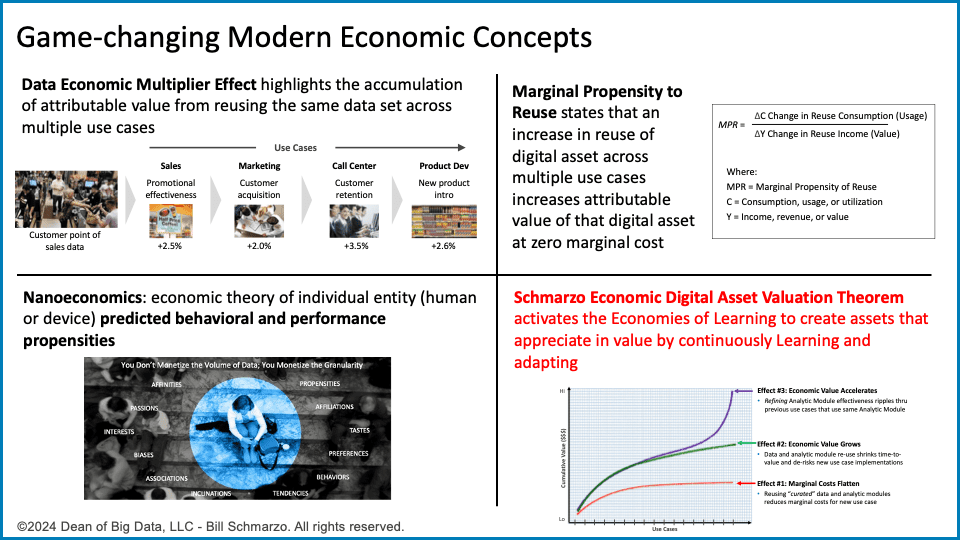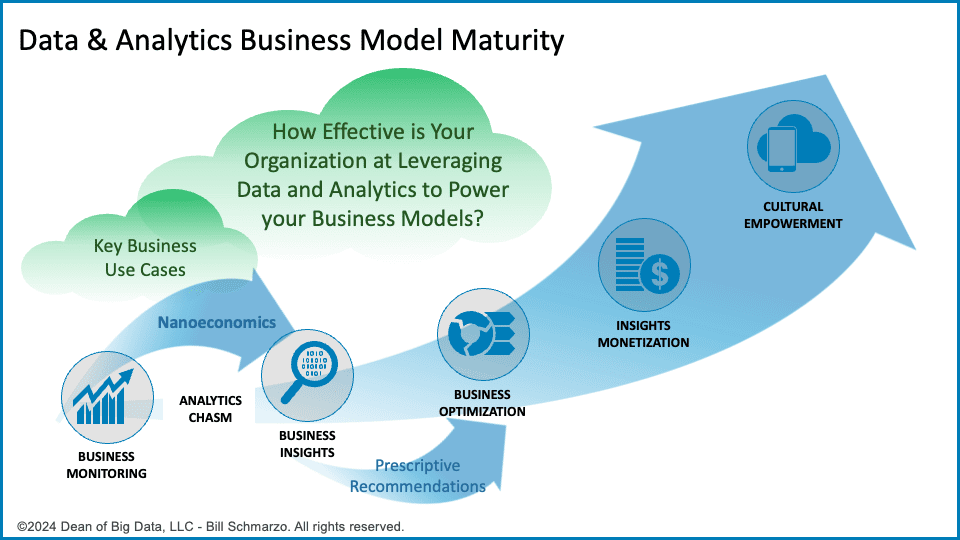
The Chief Data Officer (CDO) role has evolved significantly over the past five to seven years. It has transitioned from a CIO Mini-me, focused on managing data infrastructure, to a business executive tasked with deriving value from the organization’s data. Senior management now recognizes the potential of data to optimize operations, mitigate risks, generate new revenue streams, and create a more compelling, differentiated customer experience. As a result, there is an increased demand for CDOs with economics training, highlighting the importance of an interdisciplinary approach to data management, advanced analytics, and business strategy.
Research shows that CDOs with economic backgrounds are increasingly successful[1]. Economics training equips CDOs with a robust framework for creating value and aligning data initiatives with organizational business and operational goals. These economics-equipped CDOs blend technical data expertise with strategic economic principles, enhancing their ability to interpret complex data and optimize operational decision-making. Their understanding of causal relationships and business implications further aligns data and AI strategies with broader organizational goals.
“The CDO Toolkit”
The original title for my book, “The Economics of Data, Analytics, and Digital Transformation,” was the “CDO Toolkit.” Given the CDO’s rapidly changing role and charter, I envisioned the book as a comprehensive resource to help CDOs navigate their evolving responsibilities. The CDO could use a toolkit to help them apply modern data economic concepts to unleash the value of their data by optimizing or re-engineering key business processes, reducing operational and compliance risks, creating a more compelling and engaging customer experience, and driving data-driven innovation. This toolkit would equip CDOs with economic-based strategies and methodologies to manage and leverage data more effectively as a strategic business asset (Figure 1).

Figure 1: Source: “Is God An Economist?”
Organizations increasingly recognize the importance of leveraging data for a competitive edge. This has led to a growing requirement for Chief Data Officers (CDOs) who have a firm grasp of business and economic principles and the ability to “more effectively leverage data and analytics to power the organization’s business and operational models” (Figure 2).

Figure 2: Data & Analytics Business Model Maturity Index
Let’s consider a situation where you need to interact with the Chief Data Officer (CDO) of a major theme park. Let’s explore how modern economic concepts can help facilitate a more relevant and meaningful discussion with the CDO.
Engaging a CDO: Theme Parks Scenario
Leading theme parks concentrate intensively on guest experience, utilizing sophisticated metrics to measure customer satisfaction and engagement. These metrics can encompass four core indicators: Safety, Courtesy, Show, and Efficiency, each contributing to exceptional service and memorable guest experiences.
To effectively engage the theme park’s CDO, aligning with the business and operational initiatives that the CDO is seeking to optimize is crucial. Start by thoroughly researching how data and analytics can enhance guest experiences in the abovementioned areas. Tools like the “Dean of Big Data” GPT can be invaluable in identifying, exploring, and understanding potential use cases (it’s free if you have ChatGPT4). This preparation will help you shape your conversation around initiatives to improve guest experiences, thus resonating with the CDO’s objectives and demonstrating your commitment to their key concerns. Table 1 lists some use cases that the “Dean of Big Data” GPT identified that might be relevant to the CDO conversation.
| Guest Satisfaction Aspects | Potential Use Cases |
| Safety: Ensure guests feel safe and fully enjoy their experience without worry. | Predictive maintenance for rides and attractions to prevent accidents and unplanned downtime |
| Real-time monitoring, alerts and recommendations for crowd control and emergency response | |
| Facial recognition for enhanced security and lost child recovery | |
| Health monitoring and safety compliance tracking for staff | |
| Courtesy: Accentuate the importance of friendly, polite, and helpful employees (cast members) | Real-time sentiment analysis of guest feedback to customize staff interactions and improve guest experience |
| Personalized guest services using AI chatbots and virtual assistants to optimize park flow and guest experience | |
| Employee training programs using AI-driven simulations for better service | |
| Automated language translation services for international guests | |
| Show: Create an immersive experience that contributes to the overall brand magic. | AI-driven content creation for immersive shows and attractions |
| Personalized Virtual reality (VR) and augmented reality (AR) experiences | |
| Real-time data analytics to adjust shows and in-park promotions based on guest engagement | |
| Efficiency: Eliminate inefficiencies and streamline operations to minimize guest frustration. | Optimizing park operations through AI-driven scheduling and staffing |
| Queue management systems using real-time data to reduce guest wait times | |
| Optimizing energy, water, and waste management systems for cost savings and sustainability | |
| Predictive analytics for inventory and supply chain management |
Table 1: Potential “Improve Guest Experience” Use Cases
While the data and analytic technologies enabling these use cases are essential, the CDO will probably find the economic aspects of the data and analytics conversation even more compelling. Focusing on how to leverage data and analytics to create new sources of value for guests, the park, and individual attractions will better align with the CDO’s strategic goals. Highlighting the economic impact of data initiatives – such as increased revenue, improved operational efficiency, and enhanced guest satisfaction – can make your conversation more relevant, meaningful, and impactful.
Table 2 outlines how various economic data concepts can assist the CDO in unlocking the economic value of their data.
| Data Economic Concept | Benefits to Guest Experience Satisfaction Initiative |
| Data Economic Multiplier Effect | The accumulation of attributable and quantifiable value from using a data set across multiple use cases. For the CDO, this means investing in the most important data sets that can be used to support multiple use cases, such as reducing ride wait times, personalizing guest interactions, promoting in-park activities, and increasing guest advocacy. |
| Economies of Learning | Improves decision-making and innovation over time, leading to continuously better guest experiences. By learning from customer, service, operational, and market data patterns, the CDO can enable the continuous refinement of attractions, services, and interactions to meet evolving guest expectations and preferences. |
| Nanoeconomics | Optimizes individual customer experiences by tailoring interactions, increasing guest satisfaction. Personalized recommendations, targeted marketing, and customized experiences based on micro-level data analysis can make each guest feel uniquely valued and catered to, driving higher engagement and loyalty. |
| Marginal Propensity to Reuse | Maximizes return on data investment by reusing data and analytics across use cases, leading to consistent improvements in guest experiences. Data collected in one area (e.g., dining preferences) can be applied to enhance other areas (e.g., in-park personalized dining recommendations), ensuring a cohesive and enriched guest journey. |
| Schmarzo Economic Digital Asset Valuation Theorem | Prioritizes data investments based on potential business outcomes, ensuring data-driven strategies enhance guest experiences. The CDO can allocate resources to the most impactful data initiatives, such as predictive maintenance for attractions or enhanced guest service training programs, ultimately boosting the overall quality of the guest experience. |
Table 2: Mastering the Economics of Data and Analytics
CDO: Thinking Like an Economist Summary
If you want to communicate effectively with the Chief Data Officer (CDO), it’s essential to understand that their role has evolved significantly. They are no longer just responsible for managing data systems; instead, they now focus on using data to create business, operational, and customer value. This shift means there is a growing demand for CDOs with a background in economics. Research shows that CDOs with expertise in economics are successful because they can combine their technical knowledge of data with strategic economic principles. This unique blend of skills allows them to lead their organization in leveraging data and analytics to achieve better business and operational outcomes.
[1] PWC “The Chief Data Officer: the key to business strategies, innovation and culture that deliver value”, Deloitte Insight “Organizing to drive change” and Splunk “The Chief Data Officer Role: Responsibilities, Skills & Career Path”.
